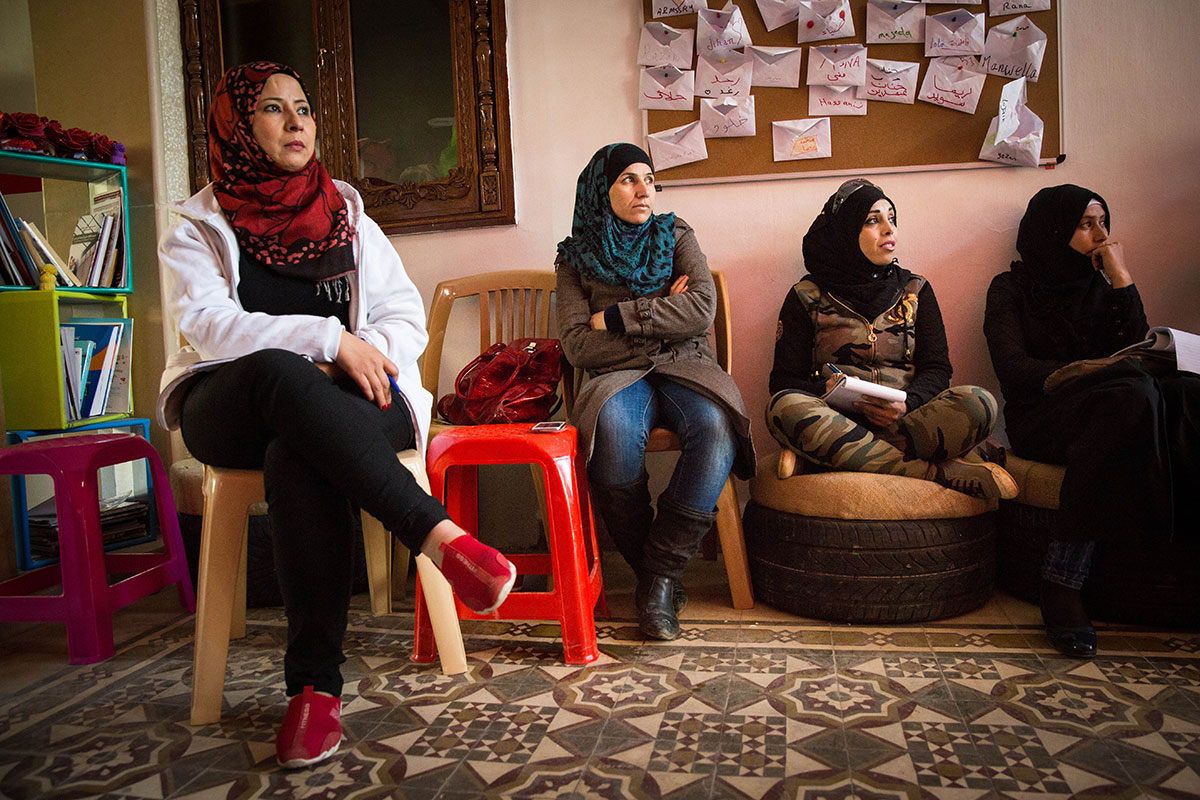Refugees, asylum seekers, single women, and women heads of families who have made the long journey of uprooting. Women who have arrived in our country from war zones, from countries of origin where forced marriage, female genital mutilation, and other harmful practices are practiced.
Women who experience multiple forms of violence during the journey or in the host country, who have been or continue to live, in an abusive environment.
Women living in a country they do not know. Lives in uncertainty, lives sealed by waiting: to be reunited with their family, to go through the process and be granted asylum, to see what happens to the rest of the people left behind at home.
Women from Iran, Iraq, Kuwait, Syria, and Afghanistan, some young girls and others older, daughters and mothers together, make up the multilingual refugee empowerment groups organized by the Diotima Center, piloted since September 2018.
Refugee empowerment groups
The groups are part of the Prevention and Response to Gender-Based Violence in Urban Areas program, implemented with the support of the International Rescue Committee (IRC), UNHCR Greece, and European Civil Protection and Humanitarian Aid Operations (ECHO), for the period September 2017 – December 2018.
“Initially, for the months of September – October, the teams operated with the participation of refugees already served by the Diotima Centre. These were women who were familiar with our services and had established trusting relationships with the institution and its professionals.
From the month of November, the groups will be opened, including beneficiaries from other institutions. For this purpose, a call will be made to civil society organizations active with refugees living in the urban fabric of Athens”, says Anna Salvannou, empowerment officer, who “runs” the groups.
Women’s Network
Up to 10 refugee women can participate in each group. The groups are divided into eight themes, carefully selected to meet the specific needs of this vulnerable group of women.
The themes are: “Vocational skills and the labor market”, “Women and rights”, “Women’s inspiring stories”, “Safe travel in the city”, “Athens through women’s eyes”, “Women’s hygiene and personal care”, “Family planning”, “Stress management” (the last two groups are organized by Médecins sans Frontières).
“Through the empowerment groups, our goal is twofold: first, we seek to inform women about their rights in work, education, family, and their rights as asylum seekers. Indicatively: in some groups, the women refugees explore their professional skills, learn how to look for work, and what their labor rights are, as far as the Greek reality is concerned; in others, they get acquainted with the new city in which they have to live in, etc.”.
“But the most important thing, for us, is to build a network among the refugees themselves. Besides, the need to strengthen relations between them becomes immediately apparent once one sees that these women often live alone, without any other support framework than the services they receive, in an unfamiliar environment, which is characterized by its uncertainty”.
We are all women
At the same time, in the groups, there is a special focus on informing refugee women about women’s rights. An effort is thus made to bring the women refugees into contact with the acquired experience of the struggles, demands, and results of the Western feminist movement.
As Anna says: “In this context, we want to forge, in the group, the sense that despite the differences (different cultural and linguistic backgrounds, different experiences, etc.) there is a very important common ground: we are all women, who experience or may experience discrimination or the threat of discrimination and/or attack, and it is necessary to strengthen the community of our characteristics in order to develop our potential, explore our talents and strengths, and evolve”.
You are not alone
But how do women themselves perceive themselves within the group? “The women refugees understand the need to relate to each other and socialize themselves through the group. This is evidenced by the fact that many make a long journey to come every week.
At the same time, they show great interest in their stable presence in a place that does not treat them as beneficiaries – as people being served, in a safe context in which they feel that their participation is equal.”
How do refugee women perceive discussions on women’s rights? “Recently, in a group on women’s rights, we started by discussing social gender, and what it means to be a woman. One refugee mentioned the first thing that came to her mind: in her country, when she gave birth to her first child, who was a girl, she was not given food for two days.
This experience had been very traumatic for her and was particularly difficult for her to share. The other women in the group listened to her, comforted her, encouraged her, and felt her experience, even though they had not lived it themselves. Even humor came into play to lighten the mood. In the end, the woman seemed relieved.
It is impressive to see women sharing difficult experiences and/or their joy, and various dynamics develop. This is exactly where the goal of the group comes together.”
“At the same time, this whole process empowers the survivors of gender-based violence themselves, as when women know they are not alone, they can recognize their strength and cope with/overcome traumatic events in their lives.”
Social inclusion
“Empowerment groups also play an important role in the social integration of refugee women. Through the network of women, which is gradually being built, the refugees can share information and experiences.
For example, some women, who may have been living in Greece for three years, have made significant steps in their integration and are ready to give beneficial information to another woman who has been here for only three months.
Also, those who have been living in the country for years can identify some common characteristics, understand better how the newly arrived woman feels, and feel the difficulties she faces even in basic issues, such as which bus is the right one, which is the safest and shortest route, etc.
Experiential approaches
Two groups take place every week. They are two hours long, and each one is conducted either in French, Arabic, or Farsi, with interpretation. “Women can participate freely, without any prerequisite, either in one meeting or in the whole cycle of eight meetings. After all, this is why each thematic group is repeated throughout the month, in cycles,” says Anna.
In the meetings, the topics are approached in an experiential way. “Our concern is to foster the increasing participation of the women themselves. In this context, sometimes smaller groups are formed within the group itself, so that the women have more time to listen and talk, share experiences, and see themselves in the group.
It is not a few times that women refugees present something to the group on their own initiative or suggest topics that would be of interest to them to be included in our themes.”
Outside the walls
“At the same time, in order to make the groups more interesting, we work on the topics in different ways: through discussion, presentations, experiential activities, and screenings, but also by going outside the office boundaries and meeting in other places in the city, getting to know new places that women can then visit alone or with their friends and families, offering information and knowledge that can then be used by the women themselves”.
“So far we have offered the possibility of a free visit to the amusement park, we are exploring the possibilities of film screenings in cinemas or places specially designed for this purpose, visits to museums, etc. In this context, on 16/11, there will be a visit to the historic site of the Polytechnic and a discussion on the anniversary of the 1973 uprising.
Besides, we believe that informing the refugees about the modern history of the country, and the history of claiming rights also plays an important role in terms of both their social integration, especially those who are going to or intend to stay in Greece, and in their choice of an assertive, struggling position”, says Anna.
Synergies with institutions
At the same time, various synergies with other institutions, organizations, and spaces are promoted. For example, “the organization of skateboarding lessons by the free movement skateboarding organization for the children of the women participating in the empowerment groups is already planned. The courses will be held in English.
Our expectation is that they will be a good occasion for women to meet in places of the city that are not ‘service spaces’, in common places, beyond language barriers, in order to meet and bring together women from different cultural and social backgrounds. Possibly they might even form skateboard groups themselves!” says Anna enthusiastically.
It is worth noting that there are plans to set up groups with young women and with topics of more interest to a younger population, and an English-speaking group is also planned.
And how Anna herself feels implementing the empowerment groups: “These first two months, because we were in a pilot phase, we were trying to explore what works, what we need to fix, how we can increase women’s participation.
Despite the stress and running around, the days when the teams meet are rich: seeing women coming e.g. from Ilion, breaking the habit of staying at home, seeing women who do not leave the office after the groups because they have opened a conversation in a calm safe environment, knowing that this whole process will have a long term gain that will contribute to their own and their children/families’ well-being, is the greatest reward.”
*** source of original photo aljazeera







